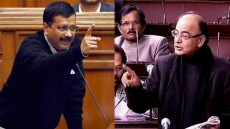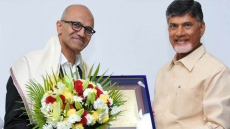“Kissing” Pakistani soil “soaked” in Indian blood will prove “costly”, Shiv Sena said on Monday as it reminded Prime Minister Narendra Modi of how trying to get “too close” to that country led to decline in political graph of BJP veterans like Atal Bihari Vajpayee and L K Advani.
“What needs to be remembered is that there is an orthodox belief that in the past, no politician who has tried to get too close to Pakistan has been able to remain in politics for long.
“L K Advani once went to the tomb of (Muhammed Ali) Jinnah and praised him. After that his political graph started declining and today he has been sidelined,” the Sena said in an editorial in party mouthpiece ‘Saamana’.”
Shiv Sena, the BJP’s oldest ideological partner, also recalled former Prime Minister Vajpayee’s Lahore visit and his talks which Pakistan’s ex-dictator Pervez Musharraf in Agra to emphasise on how the two engagements did him little good.
“(A B) Vajpayee, in a bid to mend the strained relations between the two countries started the ‘Lahore bus’ service and also went out of his way to meet General (Pervez) Musharraf in Agra. After that never did a BJP government come to power under the leadership of Vajpayee,” it said.

It also wanted to know how would have BJP reacted if a Congress Prime Minister made an unannounced stopover in Pakistan.
“The whole country is asking if BJP would have similarly welcomed a Congress PM’s unannounced stopover in Lahore like they did Modi’s. Pakistan’s soil is cursed and kissing it would prove to be costly because it is soaked in the blood of lakhs of innocent Indians,” the party said in the editorial.
The criticism by Shiv Sena, which shares power with BJP both at the Centre and in Maharashtra, follows a strident attack on Modi by opposition Congress.
The pro-Hindutva party has been critical of Modi on several issues, including his comments terming the Dadri lynching and cancellation of Pakistani singer Ghulam Ali’s concert in Mumbai following protests by the Sena as “unfortunate”. It had also targeted Modi for extending a one billion USD line of credit to Mongolia when Maharashtra faced drought and farmers were committing suicide.





